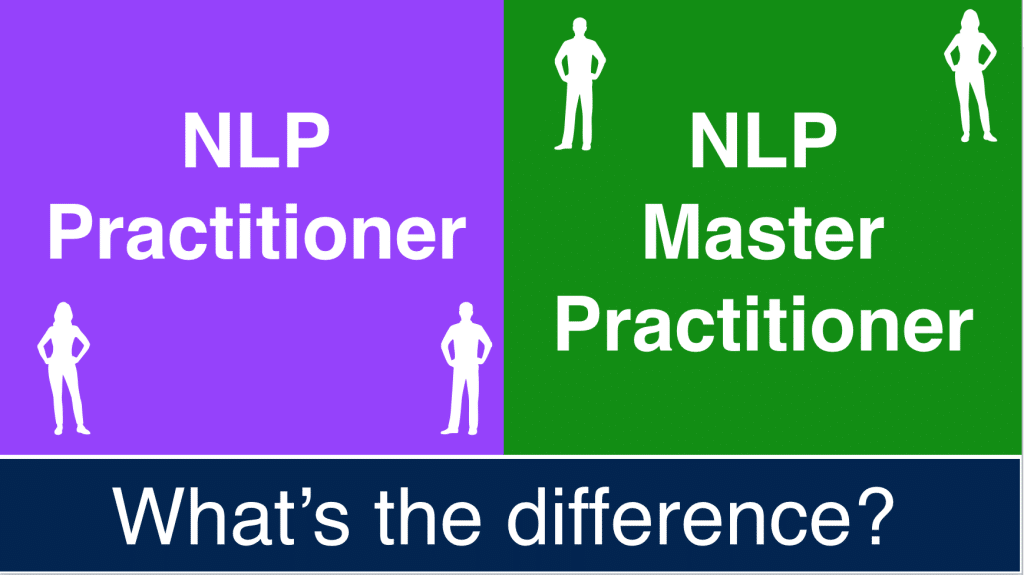What is the difference between an NLP Practitioner and an NLP Master Practitioner? NLP as a profession
NLP Practitioner and NLP Master Practitioner are the professional titles given to graduates of the respective NLP Practitioner and NLP Master Practitioner professional assessment and certification courses.
The qualifications and courses have been around since the 1980s and are now generally recognised worldwide in professional circles.
One way to look at it is – An NLP Practitioner is a highly skilled professional guide/coach. An NLP Master Practitioner is a super-skilled professional guide/coach
From NLP beginner to NLP Master
The NLP Practitioner course is designed for beginners and also students of NLP who have not previously gained any professional qualification in the subject.
The NLP Master Practitioner course follows on from the NLP Practitioner course and assumes knowledge at the Practitioner level. It also assumes that the student has qualified at the Practitioner level and has the skills of an NLP Practitioner.
An NLP Trainer or Master Trainer is required to assess the work of both NLP Practitioners and Master Practitioners as they study and to certify their end competence.
NLP Master Practitioners may go on to become an NLP Trainer/Master Trainer and train other NLP Practitioners and Master Practitioners.
NLP is a very versatile subject and is a study of human experience, change and excellence.
NLP provides students with attitudes, methodology, and a series of techniques that we can use to produce excellence and resolve/remove mental blocks so that we get more joy and fulfilment from life.
We can apply NLP to help ourselves and we can pass it on to help others.
Who is NLP suitable for?
Individuals- NLP techniques are suitable for use with all ages, right the way through from infants (who are at least at the age where they are able to verbally communicate and have started to develop a degree of self awareness) to still curious pensioners who know that they have plenty to give.
Individuals and businesses – NLP Practitioners and NLP Master Practitioners are a type of consultant/coach. They are armed with skills & techniques to help other people and businesses progress and move forward with stealth and ease.
The main differences between NLP Practitioners and NLP Master Practitioners
The main difference between NLP Practitioner and NLP Master Practitioner professionals is in their depth of knowledge and how to apply it with their skills.
An NLP Practitioner will be professionally certified as competent in the skills and techniques of NLP at Practitioner level. These techniques are various, the uses are widespread and they are highly valuable.
An NLP Master Practitioner will be professionally certified as competent in the skills and techniques of NLP at Practitioner and Master Practitioner level. They will be assessed on their mastery of NLP as a skillset.
An NLP Master Practitioner will be rewarded for the extra study time and practical time spent applying the skills with others by developing a deep understanding of the subject, techniques and how the different techniques interact with each other to produce their results.
NLP Master Practitioners will generally have more options available in terms of solutions for their clients and techniques that they can use. NLP Master Practitioners will be skilled to mix and match NLP techniques for unique and bespoke solutions for their clients.
Most NLP Practitioners develop a love for their subject and go on to become NLP Master Practitioners in order to complete their jigsaw puzzle.
A certified NLP Practitioner may simultaneously be certified as an NLP Coach. Some NLP Practitioners combine their NLP skill with hypnosis and hypnotherapy to help their clients.
NLP Master Practitioners may also be certified as a Master NLP Coach. Some NLP Master Practitioners combine their NLP skill with higher level hypnosis and/or hypnotherapy to assist their clients.
Study to become an NLP Practitioner and an NLP Master Practitioner on our international NLP certification Training Courses.

